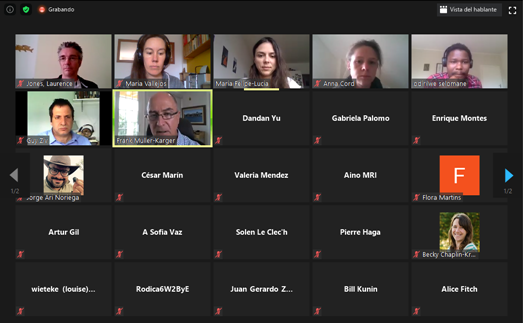Last July 8, the Ecosystem Services Working Group session took place within the framework of the GEO BON All Hands Meeting Conference 2020, in which more than 50 members participated. The discussions revolved around analysing the links between ES monitoring at the global and local scale. Although monitoring of global Essential Biodiversity Variables data is a major goal for GEO BON, within the GEO BON network of observation sites, much data is collected at the local scale. Many Essential Ecosystem Services Variables (EESV) and Ecosystem Services are based on local observations from terrestrial, freshwater, and marine observatories. Moreover, local drivers and cultural specificities are important denominators in defining the potential supply and demand for ecosystem services, both regionally and globally. Given these nuances, the session discussed how to link monitoring at local to global scales.
The session was organised around three topics:
- “Monitoring ecosystem services from global to local scales” (Guy Ziv, moderator)
Most decisions are done at a local scale, but many global scale indicators are either remotely sensed or disaggregated to a ‘pixel size’ that seems not compatible with local decisions. The focus of the discussion revolved around how indicators for monitoring Ecosystem Services on a global scale are linked to those at local scales. We analysed experiences to evaluate information at the local scale for indicators, models, and validation, using local data. There is a need for better utilisation of observational data available on public databases; though the importance of guaranteed accessibility, interoperability and data management must not be forgotten. Locally adapted and high resolution data layers are crucial for the success of GEO BON for the engagement of both decision-makers as well as their network of observatories.
- “Connecting essential ecosystem services variables (EESV) to essential biodiversity variables (EBV)” (Frank Müller-Karger, moderator):
We need to understand how indicators for monitoring ecosystem services are linked to EBVs and how the development of EESV is related to biodiversity. It is necessary to think about how we better link stakeholders who benefit from biodiversity in the EESV framework, and focus EBV development on addressing real needs. Moreover, during the next years it would be important to define a relevant set of specific and narrow EESV and EBV, necessary to promote the main international initiatives (e.g. CBD, SDG, IPBES, UNFCCC, National governments, private sector). Part of the approach may be to use existing models and evaluate which EBVs are important for particular applications, and develop the biodiversity dimensions of those EBVs. We should be able to demonstrate the relationship between a subset of EESVs and specific high value EBVs needed to quantify or model the EESVs.
- “Using local knowledge and data in EESV” (Laurence Jones, moderator):
In the academic field, there is a lot of emphasis on local knowledge, and issues of diversity and inclusion are increasingly important. But, how do we incorporate local knowledge into decision making? GEOBON has a biological perspective and there are no observatories of social data. Aspects like specific knowledge about the environment, shared values, relational values can be quite different things, but all share the common property that they are difficult to quantify, difficult to upscale, and are rarely taken into account in decision making. When we talk about values and perceptions, we are talking on the demand side (people’s interactions with nature and the services that arise), and in general it is more difficult to find indicators and measures than when we think about EESV on the supply side. Social media is being increasingly used but it does not capture the totality of the social perceptions. We have a big challenge in finding metrics and quantifying them in a standard way, and social scientists should be incorporated in the discussion to find better indicators.

Organizers: Vallejos, Maria; Selomane, Odirilwe; Ziv, Guy; Jones, Laurence; Muller-Karger, Frank; Vaz, Sofia Ana; Montesh, Enrique; Gosal, Arjan; Cord, Anna
Participants: Abd Elbasit, Mohamed; Agyei-Ohemeng, James; Ari Noriega Alvarado, Jorge; Atique, Usamn; Bajjouk, Touria; Bennett, Elena; Blanchard, Ryan; Cardoso, Isabela; César de Sá, Nuno; Chaplin-Kramer, Becky; Clech, Solen; Escobar, Elva; Faria, Ana Paula; Felipe-Lucia, Maria; Filipe, Anna; Fitch, Alice; Fletcher, David; Gil, Artur; Isbell, Forest; Joshi, Anupam; Kulonen, Aino; Liu, LingLing; Mahdavi, Ahmad; Mairota, Paola; Manzi, Hilda; Marín, César Marín; Martins, Flora; Mauna, Jaime; Mendez, Valeria; Moity, Nicolas; Mulukwane, Cecilia; Palomo, Maria Gabriela; Peh, Kelvin; Pelletier, Dominique; Pena, Rodica; Proença, Vânia; Rahagalala, Pierre; Ribeiro, Milton; Salinas-Mendoza, Adriana M.; Silva, Rafaela; Tsiafouli, Maria; Willemen, Wieteke; Yu, Dan’dan; Zimmer, Martin.
